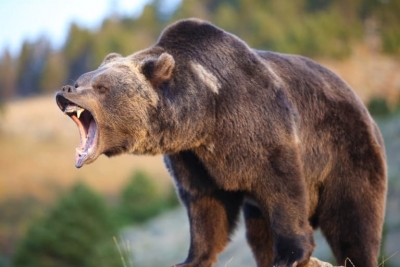
Grizzly bear is a subspecies of the brown bear, found in North America and Canada. It has brown fur, but hairs on the shoulders and back has streaks of white which give them the “grizzled” look. It also has a hump on its back. Its diet includes berries, leaves, nuts and fish, rodents and moose. Hibernation lasts between 5 and 8 months. It is a great swimmer and runner. It has an excellent sense of smell.
Grizzly bears have become “famous” thanks to pictures of them catching salmon in shallow rivers, such as in the streams of the Kodiak Archipelago of Alaska. However, due to climate change, some bears are switching from eating salmon to eating elderberries, as early warming causes the berries to bloom prematurely. Because bears in the archipelago previously ate up to 75 per cent of a salmon population in a region, researchers believe the dramatic increase in salmon populations will disrupt the entire food chain on the islands. For example, fish carcasses not only enrich the soil around rivers, they also provide an important food source to other animals.
Although grizzly bears eat a variety of different insects, moths are available to them in large numbers. Grizzly bears have been seen moving through boulder fields and turning over heavy rocks to feed on masses of army cutworm moths. A grizzly bear in Yellowstone National Park was seen to have consumed over 40,000 moths in one day. However, eating this many in a day is uncommon.
Canada is famous for its grizzly bears. Unfortunately, however, grizzly bears have been assessed as a species of special concern, meaning they could become threatened or endangered in the future. They are threatened by climate change, unsustainable hunting, habitat loss and extremely low reproductive rates. There are about 33,000 grizzly bears in the U.S. (mainly in Alaska) and about 26,000 grizzly bears in Canada (mainly in BC). Hopefully, Canadians are willing to protect grizzly bears and their habitat, because a future without these amazing animals would, indeed, be unbearable.
Picture Credit : Google




